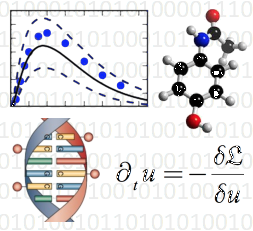The Quantitative Systems Pharmacology and Toxicology Research Group¶
Recent News
Jady Sharp recently joined the group as part of the SURE (Scott Undergraduate Research Experience) program. Welcome Jady!
We welcome two undergraduate researchers who recently joined the group: Kayla Titus and Andy Quach! Kayla is investigating various aspects of the disposition and effects of microcystins in humans, and Andy is laying the groundwork for a hazard characterization for dimethylformamide (DMF).
Congratulations to Sohaib Habiballah for some recent publications! They are “A deep-learning approach for identifying prospective chemical hazards” , “The in silico identification of novel broad-spectrum antidotes for poisoning by organophosphate anticholinesterases” , and “Adapting physiologically-based pharmacokinetic models for machine learning applications” .
Audrey O’Connor, an undergraduate student in Biology at St. Johns University, joined the group as part of the Summer Research Experience for Undergraduates (REU) in Molecular Biosciences . She will be working on a project investigating the effect of celiac disease on drug pharmacokinetics. Welcome Audrey!
Abby Moore recently joined the group. Abby is working on characterizing the pharmacokinetics and pharmacodynamics of microcystins. Welcome Abby!
Brad Reisfeld published an article in The Conversation entitled “Heading to a beach this summer? Here’s how to keep harmful algae blooms from spoiling your trip”
Natalie Calahan and Jacob Maslowski recently joined the group as part of the SURE (Scott Undergraduate Research Experience) program Welcome Natalie and Jacob!
Brad Reisfeld published an article in The Conversation entitled “Poisons are a potent tool for murder in fiction - a toxicologist explains how some dangerous chemicals kill”
Brad Reisfeld gave a radio interview on the All Sides with Ann Fisher program on Ohio public radio (WOSU).
Brad Reisfeld published an article in The Conversation entitled “Does this cause cancer? How scientists determine whether a chemical is carcinogenic – sometimes with controversial results”
Sohaib Habiballah won an Honorable Mention, Great Minds in Research Award (OVPR), at the Colorado State University graduate student showcase. Great job, Sohaib!
Brad Reisfeld returned from a sabbatical leave as a Visiting Senior Scientist at the World Health Organization’s International Agency for Research on Cancer in Lyon, France. Several publications resulting from this work are “IARC Monographs Vol 131 group. Carcinogenicity of cobalt, antimony compounds, and weapons-grade tungsten alloy”, “kc-hits: A tool to aid in the evaluation and classification of chemical carcinogens”, and “IARC Monographs Vol 130 group. Carcinogenicity of 1,1,1-trichloroethane and four other industrial chemicals”,
Brad Reisfeld is serving on the National Academies of Sciences’ Committee to Review DoD’s Proposed Occupational Exposure Limits for Trichloroethylene.
Liliana Arida-Moody, an undergraduate student in Biophysics at the University of Michigan, joined the group as part of the Summer Research Experience for Undergraduates (REU) in Molecular Biosciences. Welcome Liliana! Following the REU, Liliana has continued work in the group, conducting research involving machine learning and the development of quantitative structure activity relationships.
Ryan Arey and Brad Reisfeld had a paper published in Antimicrobial Agents and Chemotherapty entitled “Predicting the Disposition of the Antimalarial Drug Artesunate and its Active Metabolite Dihydroartemisinin Using Physiologically-Based Pharmacokinetic Modeling”.
Congratulations to Ryan Arey on completing his MS degree and landing a job at CFD Research Corporation. Ryan recently changed jobs and is now at Abbvie.
Congratulations to Nan-Hung Hsieh on completing his postdoctoral fellowhip with Weihsueh Chiu at Texas A&M University and securing a new job with the California EPA.
Congratulations to Natalie Rios and Cole Harris on their recent graduation from Colorado State University. They will be missed.
Sohaib Habiballah won a College of Engineering Scholarship Award for his poster “Using Machine Learning to Inform the Development of Antidotes for Nerve Agent Poisoning” at the CSU Graduate Student Showcase
Who We Are¶
The Quantitative Systems Pharmacology and Toxicology (QSPT) Research Group at Colorado State University is a diverse team of faculty and students that focuses on developing and applying rigorous mathematics, computational tools, and targeted experimentation to study the disposition and effects of toxicants, drugs, and other foreign chemicals on the body.
Through cross-disciplinary collaborations, we also explore linkages between human, animal, and environmental health and work to create technologies to promote wellness across these domains.
More details about the people in our group can be found here.
Our Projects¶
Our current project themes include …
Contact¶
If you are interested in joining or collaborating with our group, please contact Brad Reisfeld.
